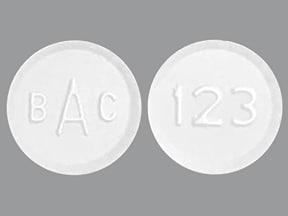Pill with imprint BAC 123 is White, Round and has been identified as Acetaminophen, Butalbital and Caffeine 325 mg / 50 mg / 40 mg. It is supplied by Nexgen Pharma, Inc.
Acetaminophen/butalbital/caffeine is used in the treatment of Headache and belongs to the drug class analgesic combinations. Risk cannot be ruled out during pregnancy. Acetaminophen/butalbital/caffeine 325 mg / 50 mg / 40 mg is not a controlled substance under the Controlled Substances Act (CSA).

Acetaminophen, Butalbital and Caffeine
- Imprint
- BAC 123
- Strength
- 325 mg / 50 mg / 40 mg
- Color
- White
- Size
- 12.00 mm
- Shape
- Round
- Availability
- Prescription only
- Drug Class
- Analgesic combinations
- Pregnancy Category
- C – Risk cannot be ruled out
- CSA Schedule
- Not a controlled drug
- Labeler / Supplier
- Nexgen Pharma, Inc.
- National Drug Code (NDC)
- 00722-7320
-
What is Fioricet ?
Fioricet is a prescription medication primarily used to treat tension headaches. It contains a combination of three active ingredients:
- Acetaminophen (also known as paracetamol): This is a pain reliever and fever reducer commonly found in over-the-counter medications. It works by reducing the production of prostaglandins in the brain, which helps alleviate pain and lower fever.
- Butalbital: This is a barbiturate, a type of central nervous system depressant. It acts as a muscle relaxant and can also provide pain relief. It works by relaxing muscle contractions in the head, neck, and shoulders, which can contribute to tension headaches.
- Caffeine: Caffeine is a stimulant that is often included in headache medications because it can enhance the effectiveness of pain relievers. It helps to constrict blood vessels in the brain, which can reduce the intensity of headaches.
The combination of these three ingredients in Fioricet provides both pain relief and muscle relaxation, making it effective for relieving tension headaches. It’s typically available in tablet or capsule form and is taken orally. However, Fioricet contains butalbital, which is a barbiturate, and it has the potential for abuse and addiction. Therefore, it’s essential to use Fioricet only as prescribed by a healthcare professional and to follow their instructions carefully.
What You Should Know About Fioricet ?
Fioricet is a medication commonly prescribed for tension headaches. It contains a combination of three active ingredients: acetaminophen (paracetamol), butalbital, and caffeine. Here’s a detailed guide on how to take Fioricet:
1. Prescription: Fioricet is available only with a prescription from a healthcare provider. It’s essential to follow your doctor’s instructions carefully when taking this medication.
2. Dosage: The dosage of Fioricet will depend on your medical condition, response to treatment, and other medications you may be taking. Do not increase your dose or take it more frequently than prescribed, as this can increase the risk of side effects and dependency.
3. Administration: Fioricet is usually taken orally, with or without food. Follow the directions on your prescription label carefully, and ask your doctor or pharmacist to explain any part you do not understand.
4. Timing: Take Fioricet as soon as you feel a tension headache starting. It’s most effective when taken at the first sign of a headache.
5. Frequency: Fioricet should not be taken more frequently than prescribed. Typically, it’s taken every 4 to 6 hours as needed for pain relief. Do not exceed the recommended dosage or take it for longer than prescribed.
6. Avoid Alcohol: Do not consume alcohol while taking Fioricet, as it can increase the risk of liver damage due to the acetaminophen component of the medication.
7. Withdrawal: If you have been using Fioricet regularly for an extended period, do not stop taking it suddenly without consulting your doctor. Abrupt discontinuation can lead to withdrawal symptoms such as headaches, nausea, and anxiety. Your doctor may need to taper your dose gradually to prevent withdrawal.
8. Overdose: Taking too much Fioricet can be dangerous and even life-threatening due to the butalbital component, which can cause respiratory depression in high doses. If you suspect an overdose, seek immediate medical attention or contact a poison control center.
9. Storage: Store Fioricet at room temperature away from moisture and heat. Keep it out of reach of children and pets.
10. Side Effects: Common side effects of Fioricet may include dizziness, drowsiness, nausea, vomiting, and upset stomach. If any of these side effects persist or worsen, notify your doctor promptly.
11. Precautions: Before taking Fioricet, inform your doctor if you have a history of liver disease, kidney disease, substance abuse, or if you are pregnant or breastfeeding. Fioricet may not be suitable for individuals with certain medical conditions or those taking specific medications.
12. Interaction: Fioricet can interact with other medications, including certain antidepressants, anticonvulsants, and blood thinners. Inform your doctor about all the medications you are currently taking to avoid potential drug interactions.
